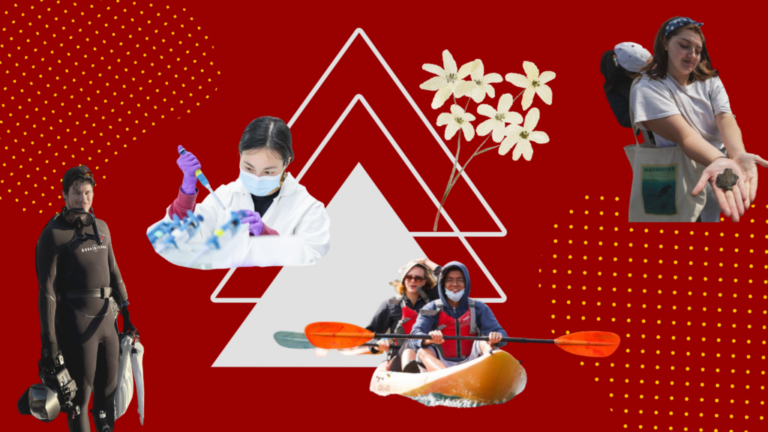
(Composite: Vanessa Codilla; Image Sources: Nick Neumann and Yannick Peterhans, USC Wrigley Institute/Jenteva Art, Canva)
Green New Year’s Resolution for Trojans: 5 Ways to Become an Environmental Changemaker in 2023
The beginning of a new year prompts many of us to reflect, set measurable goals, and make a plan for the year ahead. While many common new year’s resolutions focus on personal growth and lifestyle improvements, you can also set intentions that positively impact others and our planet. This year, how about taking steps toward becoming an environmental leader in your community? Here are some ways you can learn about and help solve today’s most pressing environmental issues — both while you’re at USC and for the long-term!
Take an environmental studies class
Becoming an environmental leader starts with understanding the evolving landscape of environmental challenges. USC‘s Environmental Studies Program (ENST) offers specialized classes in the natural and social sciences that train students to create sustainable and equitable solutions to complex environmental problems.
If you’re interested in learning about environmental problems and policies from a social and scientific lens, but aren’t sure you want to major in ENST, consider enrolling in ENST 100g: Introduction to Environmental Studies or ENST 150xg: Environmental Issues in Society. Both courses satisfy USC’s general education requirement.

Dive into experiential learning opportunities at the Wrigley Marine Science Center
Even if you are not an environmental studies major or minor, you can still get involved in activities hosted at the Wrigley Marine Science Center (WMSC), the Wrigley Institute’s satellite campus on Catalina Island.
All USC students are eligible to apply to Wrigley Institute’s 2023 Climate Career Spring Break Trip, a four-day program for aspiring environmental professionals to explore climate and sustainability careers in Los Angeles. The program culminates in an overnight trip to WMSC, where students can participate in career talks with conservation and marine scientists, as well as enjoy kayaking and snorkeling to discover Catalina Island’s unique ecology.
For a lengthier WMSC experience, students can enroll in Maymester, a four-week immersive living-learning experience that offers interdisciplinary courses, field research, outdoor activities, and special events designed to train students in environmental leadership. Given this year’s focus on urban oceans, courses offered include underwater archaeology, aquatic microbiology, coastal zone sustainability, community-based environmental research, and more.

Advance your environmental research
If you’re a graduate student or faculty member researching the intersection of people and the planet, the Wrigley Institute offers numerous opportunities to support you. Graduate fellowships are open to all USC Dornsife Ph.D. students and fund environmental and sustainability research from across disciplines. Students can conduct their supported research on USC’s main campus, at the Wrigley Marine Science Center, or elsewhere.
Moreover, tenure-track and RTPC faculty from all USC departments and schools are eligible to apply for Faculty Innovation Awards that fund solutions-oriented research under the three following themes: earth and environmental systems, applied environmental solutions, and social transformation. More information about the 2023 award cycle will be released in January or February, so keep an eye out for our RFP announcement!

Tell powerful stories through environmental communication
In addition to seeking knowledge and conducting research, environmental leaders also have the ability to communicate with leaders, advocates, and the broader public in ways that help bring about positive change.
Those seeking to sharpen their storytelling skills can apply to Wrigley Institute’s Environmental Communications Internship, which pairs undergraduate interns with faculty members to develop skills in science translation for public audiences. Over the course of the summer, interns will tap into the fields of journalism, web design, film-making, and more to amplify ongoing environmental research.
Even if communication is not your strong suit, you can still keep up with climate-related content spearheaded by the USC Annenberg School for Communication and Journalism, which launched the Center for Climate Journalism and Communication last year to develop climate journalists and storytellers. The center partnered with student-led news organization Annenberg Media to establish the Earth desk for climate and sustainability journalism.
The USC Annenberg Innovation Lab, the USC Office of Sustainability, and USC Arts in Action also work in collaboration to support the Arts & Climate Collective, which fosters a creative space for USC community members to work on projects that use immersive storytelling technologies, visual and performing arts, and other artistic means to drive action around sustainability and environmental justice.

Get involved with sustainability efforts across the USC campus community
Becoming an environmental leader doesn’t have to be a solo journey. Addressing climate change and working towards a more sustainable future is a priority for the entire USC community.
During Earth Week 2022, the USC Office of Sustainability announced Assignment:Earth, an environmental framework that encompasses sustainability initiatives across the university. These include USC’s goals to achieve carbon neutrality by 2025 and zero waste by 2028. Campus-wide initiatives include eliminating single-use plastic beverage bottles and reducing waste sent to landfills. In addition to putting practices in place that lessen the university’s impact on the environment, Assignment:Earth also emphasizes community engagement through collective sustainability action and dialogue about how to best pursue environmental solutions centered on equity, justice, and inclusion.
Ready to get involved in saving the planet with your fellow Trojans? Get started by visiting the USC Directory of Sustainability Programs and Groups to discover scholarships, student organizations, programs, events, and more dedicated to advancing sustainability solutions on campus and beyond!
